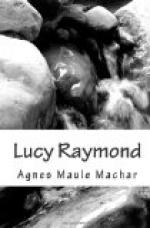Except for the one dark foreboding, that became, month by month, and week by week, more distinct, these would have been very happy days for Nelly. Her warm Irish heart found scope for its action, in continually ministering to the comfort of one to whom she was bound by ties of love and gratitude, and no harsh or unkind word now fell upon her ear. The poor Italian, always of a gentle nature, except when influenced by passion, had ever treated her with indulgent kindness, and she had given him her warm affection in return. Her assiduous attentions were labours of love, and so was the needlework at which she stitched away with diligent though unpractised hands. Coarse, hard sewing it was; but Nelly did not mind that, in the feeling that she was earning something, however small. While she sat plying her needle through the short days and long evenings of the winter, the invalid’s thoughts would wander back to long past, but unforgotten days, and he would amuse Nelly with little bits of his past history. He would describe, over and over again, his childhood’s home in the lovely Riviera, where the intense azure of the sky, and the pure sapphire of the Mediterranean, contrasted sharply with the white glitter of the rocks as they emerged in bold relief from their drapery of rich, deep-hued vegetation. He would tell her about the white Italian village, nestling among the vine-clad terraces and sloping hill-sides clad with olive and myrtle, and about the trellised house where he was born, and his father’s little vineyard, where the rich purple and amber clusters, such as little Amy now sent him as costly luxuries, hung down in rich masses which any hand could pick. Such descriptions were intensely fascinating to Nelly’s quick Celtic imagination, and she would speak in her turn of the breezy slopes by the sea where she had so often played in days she could still vividly remember; of the aromatic scent of the burning heaps of sea-weed, whose smouldering fires she used to fan; of the fresh, bracing sea-air, and dancing blue waves with their snowy crests of foam, and the distant white sails winging their way to some unknown haven.
Their talk always took a sadder tone when the Italian spoke of his later life, and told how he left his quiet village, hoping to make his fortune in the great world as a musician; how his hopes had been gradually crushed down, and he wandered from place to place till he emigrated to America, where the deadly cholera carried off his wife and her infant boy, leaving him only his little daughter; how, since then, dispirited and weary, he had managed to pick up a living as best he could, gradually forsaking more ambitious instruments for his barrel-organ, till the tide of life, gradually running low, was reduced to its lowest ebb by the shock of his daughter’s death, superadded to the decline which had long been insidiously undermining his system.
“But it will soon be over now, my child,” he said,—“all the trouble and the nursing. You have been very good to the poor forestiere since the povera went to the blessed saints. I shall soon see her again, and Anita, and the little Giulio, in the better country that the signorina was reading about,—better, she says, than the patria itself, with its olives and vines. Ah! I think I see it again, when I dream.”




